Guru
Guru : Film Review
Rating : 2.5 stars out of 5 (above average)
Direction & Screenplay : Mani Ratnam
Cast : Abhishek Bacchan, Aishwarya Rai, Mithun Chakraborty, Madhavan.
2007, Hindi , with English subtitles , and a dubbed Tamil version available.
"Guru" is emblematic of how A-list Indian film-maker Mani Ratnam is a first-grade auteur but alas a mercurial director. In particular, the strain of film-making he again shows us here, is pathognomic of his stubborn disinclination down the decades, from Iruvar (1997) to Yuva (2004) to Raavan (2010) to Kaatru Veliyidae (2017), to use others' talent for screenplays. Pic charts the rise of a semi-fictitious Indian business supremo, attempting to show us what made him tick.
Ratnam freely uses other dialogue-writers in his films, but for the the bigger backbone of story-telling, he lapses narcissistically into writing from his own limited pen. His film-craft has survived for more than three decades mainly because he has an almost peerless hold over the knack of commercial film-making in South India. If he had actually rectified the mistake lamented in the previous paragraph, what larks ! - his oeuvre would truly have been something else, and of course 'Guru' itself would have been a different film.
A R Rahman, whom Ratnam gave his first break with 'Roja' in 1992 (an act which by itself makes Gopala Ratnam Subramaniam a monumental figure in Indian art history), went on to dazzle the larger world with his creative sorcery unlike Ratnam, but like Ratnam he displays one particular dodgy trait - the itch to do something in which one is not a specialist. Rahman sometimes sings his own compositions, with varying success, and not without some truly lousy singing. Imagine the disaster if Rahman sang all or most of his songs by himself ! I posit that Ratnam has wreaked a lower, but still significant, degree of damage on his own CV by these auto-stunts.
In 'Guru', there is a superb sequence where the titular business tycoon's associate gets interviewed by a reporter in a factory. When the factory director gets asked whether he got the machinery from U.S.A, he says "No, it's from America !" - a subtly brilliant example of Ratnam's humour at work. The reporter then segues into slipping facts about how the factory is pushing its production capacity by twice the government-prescribed limit, in addition to its other illegal business practices. The factory director gets enraged at this swiftly emerging tone of accusation from who initially seemed like a harmless journalist, and shoves him out of the factory. It is a scene bristling with dramatic power, besides being a deftly inserted peek into the tactics of Gurukant Desai, the quasi-real-life business magnate of this film.
One only wishes the movie had many more scenes like this intelligently planned one, which alas it does not have. In the 2017 "Facetime" video interview with top film reviewer Bharadwaj Rangan (one also wishes Ratnam were a better film-maker to merit the Ph.D-level thesis Rangan lovingly tower-constructs around his favourite director) , Ratnam with gentle alacrity smiles and nods when asked if he'd welcome other screenplaywrights in his movies. Apparently, what we hear and see in that instance is not what we have actually seen through the years.
Pic, however, begins in a singularly impressive way, especially when elegant letters of the opening credits are swiftly typed on to beautiful cellulose. This is accompanied by the orgiastically Ottoman frisson-inducing beats of "Maiyya, Maiyya ". This frolic transpires in Istanbul, where the young Gurukant Desai (Abhishek Bacchan), itching to be a trader non-pareil, goes on to first start his career. That afore-mentioned fun-filled aside is rare in the life of Desai, who is dead serious about business. Spurning a pay rise by his employer, he returns to India, deftly weaving around mutiple nay-sayers by not just cornering the sale of imported polyster, but also by backward-integrating to manufacture it. He expands his business at an electric pace, roping in stockholders for enormous mutual gains, leaving generations-old Parsi competitors in the dust not just in profit margins but also in exponentially more aggressive corruption by bribery and unscrupulous business tactics, while being constantly hounded for his mendacity by vigilante newspaper bigshots (Mithun Chakraborty and Madhavan).
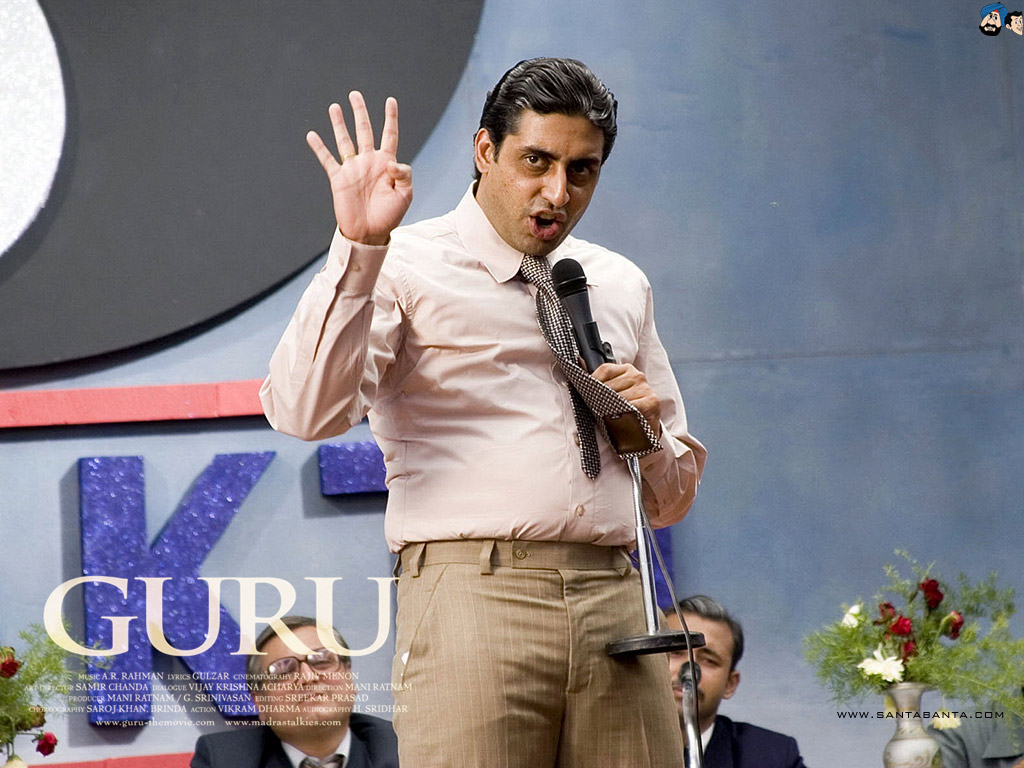
What makes Gurukant Desai great ? We are only allowed to see a rare few instances of how Guru manouevres to expand his business. First, when he has not even started, his trading market is forcibly closed down. Supposedly crafty Guru unloads and deposits heavy sacks of the unsold product in the home of the bureacrat who shut down the trading house. The woe-begone bureaucrat is overcome by misery and re-opens the market. What a joke ! You don't have to be an IAS officer with great competitive-exam scores, to have the common sense to just hire some labourers to remove and throw those offending sacks far away from your house. But in the movie's dreamland, the bureaucrat is paralyzed by this simple problem and caves in to Desai.
In the second instance , when Desai visits a politician to obtain permission for his petrochemical plant the plan for which is supposedly riddled with flaws, he gently communicates the possible use of some arm-twisting tactics if the minister does not acquiesce. But this simple strategy could also be used by a fifteen year old thug - it simply is not adequate as a triumph of Machiavellian manoeuvering.
That's it - we are not witness to any other acts of how Gurukant Desai showed extraordinary force or cleverness of mind in constructing and expanding his business empire. It smacks of terrible laziness in story-writing. "Guru" is obviously modelled on Dhirubhai Ambani (1932 - 2002) who rose from financially humble beginnings to build India's richest and most powerful business house (you'll be more inspired by India Today's 1982 and 1985 articles, freely available online, about him, than by Wikipedia's truncated account). He was corrupt no doubt, but there was also indubitably a force of personality that propelled that empire now worth several billions. You never really get to see the inner workings of this unscrupulous business giant in 'Guru'.
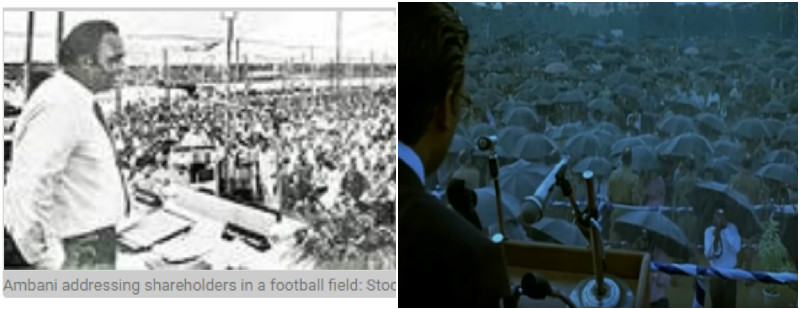
So what does Ratnam actually do with the 160 minute runtime ? Five songs round out the film, many of them brilliant compositions by A R Rahman, but the last one - celebrating the birth of twins - is a shockingly atonal drag that thoroughly exasperates us while fracturing the film's flow. Madhavan does well as an altruistic gentleman and a fearless journalist, but this is again an under-developed role that was shoved in to appease the Tamil audience for whom a dubbed version was released. Vidya Balan enacts a wheelchair-confined young lady suffering from multiple sclerosis, but apart from illuminating hitherto ignorant audiences about her medical condition, and irrespective of whatever her character was supposed to reveal about Madhavan's and Abhishek's roles, it is an utterly redundant part which robs the film of a better focus on the central track.
Then what really are the niceties in this picture? A compelling hell-cares filial angle is dangled in snatches, as Guru's father insults him for flunking his exams, but never really gives him his due when he succeeds at business despite all dissuasion. Guru somehow knows in his bones that his modestly employed father did not truly support his success, which is why he consoles his distraught faithful friend by mentioning that while he worries for his fallen pal, he never really shed a tear when his own father died ("that headmaster!", Guru obliquely refers to him). High-clarity wide-angle captures inform the lensmanship of Rajiv Menon whose visual frames bear out ample evidence of why he is also a successful ad-film-maker. Menon's graceful camerawork and A R Rahman's musical blessing bear blended lush fruit in 'Tere Bina' early in the film, where semi-classical folksy music soars through the heavens whilst Abhishek and Aishwarya, matched exquistely, dance in a beautifully radiant palace courtyard.
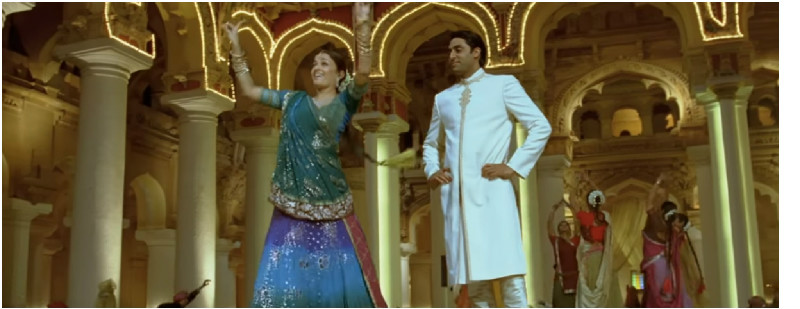
Mani Ratnam's best triumph here is to inspire Abhishek Bacchan in delivering a solidly believable rendition of the title character. Abhishek was pure dynamite in the same director's 'Yuva', and while you won't find similarly brilliant quiddity here , he still impresses multifariously. When his youthful version quietly announces with a warm smile that he will do his own business from now on, we steadily see that it is not the smugness of a fool but the implacable, breezily cheery prescience of a steely core born to do business day after relentless day, higher and higher. Superbly transformed into the filled-out contours of middle age, clad in a safari suit with thin gold-rimmed rectangular spectacles, his speech to his amazing hordes of investors, so many that they need not a hall but an entire stadium just as in Ambani's real-life, is delivered with a fond smile and dreamy bluster, its patronizing undercurrent buried by high waves of doting adoration and joint celebration. The finale in court gives him a speech that is mostly hollow, but Abhishek sails it through with a ballast of utter conviction and passion, his echoes sometimes mystically reprising the legendary lower octaves of his real-life father - the great Amitabh Bacchan.
Aishwarya Rai, as Guru's steadfast companion from tendril-youth onto twilight years, is prettily slender wallpaper decoration, wasted here as she is again three years later in the helmer's 'Raavan'. Mithun Chkaraborty is consistently if a bit boringly credible as the bulldog-morose and bull-headedly persistent newspaper publisher whose inital goodwill towards Guru bleeds into an unremitting need to engineeer exposes once he realizes the latter's chicanery. As the head of the committee investigating Guru's corruption at the end, the suit and tie donning Roshan Seth sports a delightful cosmopolitan physiognomy as a slightly rakish-seeming, professorial don whose wry smile just about hints at a person who will capsize you if you don't rise to the challenge, but who will sportingly cut you some slack if if you do actually show some spine. What a shame that Seth, admirably set up by Ratnam, is then given little to parry with.
Ratnam may deny it but this film owes strongly to Scorcese's magnificent 'Aviator' released three years before the former. ''Aviator' is dazzlingly effective in laying bare the anatomy of what made an American tycoon such a big icon. You could even argue that Abhishek Bacchan could match step for step what Di Caprio accomplished, but just see how much 'Aviator's script, its tremendous direction aside, had going for it. We actually witness the nitty-gritty of how Hughes insisted on shooting a better war film despite its exhausting logistics; of Schoonmaker's (age 64 at the time) editing wizardry as opposed to A. Sreekar Prasad having not much to play with, of how Hughes is repeatedly crippled by his obssessive compulsive disorder and yet claws back slowly but surely, the long but amazingly dogged efforts to build and fly the world's biggest airplane in contrast to no such scale of feat in 'Guru', the sizzling man-woman madness and its crackling drama as opposed to the proudly stable yet pathetically tame early-adolescent-level romantic togetherness evidenced throughout 'G', the stunning technical acme reached in Hughes's plane-crash which simply has no aesthetic, dramatic or technical extended-scene equivalent in 'G', and the expertly written, marvellously edited back and forth clash between Hughes and the senator in the hearings which make Guru's one-dimensonal court scene in the finale ( the green seat leather of 'Aviator' is switched for green table-lamps in 'Guru') seem utterly useless. If you're going to "semi-copy" another film, at least do it with pizzazz and power.
So is 'Guru' forgettable ? To the discerning audience, mostly yes. To the film analyst and student however, it is an excellent warning lesson in 'How to make a failed film with surface polish'.
-- End of Review --
Post-Script : 'Guru' nonetheless marked the box office high point of Ratnam's Hindi film sojourn (it doesn't take much to impress the mainstream audience). It had commenced with the commercially successful dubbed version of 'Bombay' (1995). 'Dil Se' (1998) is the incredible outlier in this series, cutting past every conceivable boundary to become one of the greatest films of all time (it bombed in India understandably, but soared amongst NRI Indians in the UK). Then came the narratively inconsistent Yuva (2004) which barely managed to cut even financially. After 'Guru', there was 'Raavan' (2010) plagued artistically with the same ills of the former, which again starred Abhishek, but tanked at the box-office , ostensibly ending the Ratnam-Abhishek partnership. Ratnam's uncanny knack of inspiring Abhishek to carry off a film on his own shoulders, also ended at that juncture. Abhisek's solo-hero film career plunged after that, and Ratnam has not returned to Hindi cinema since then.
UPN
UPNWORLD welcomes your comments.

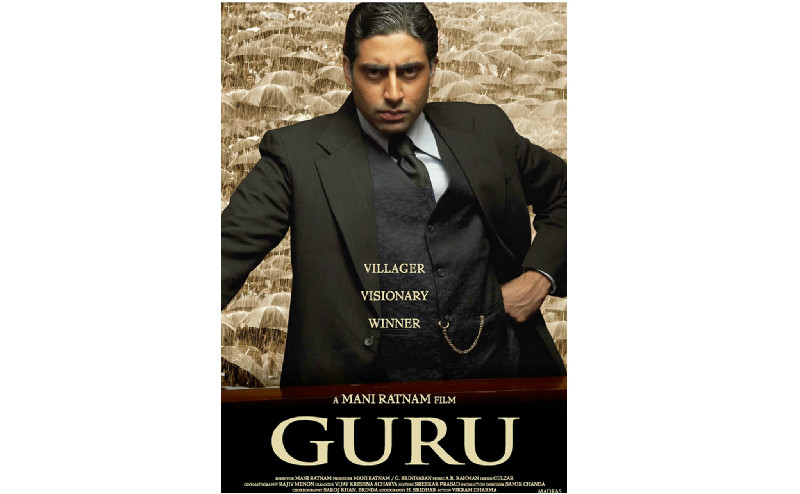
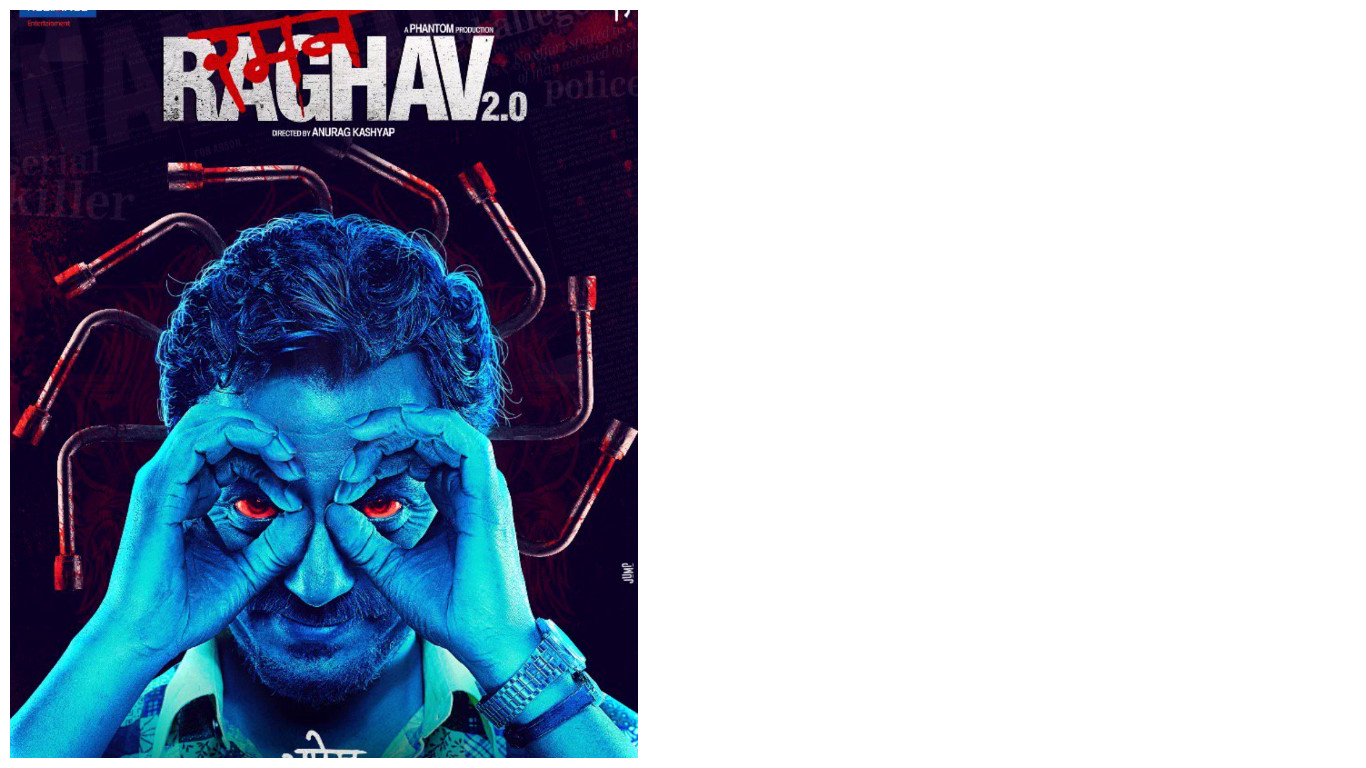

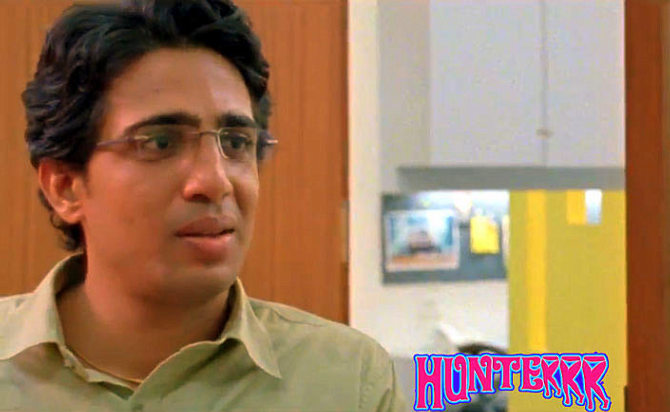
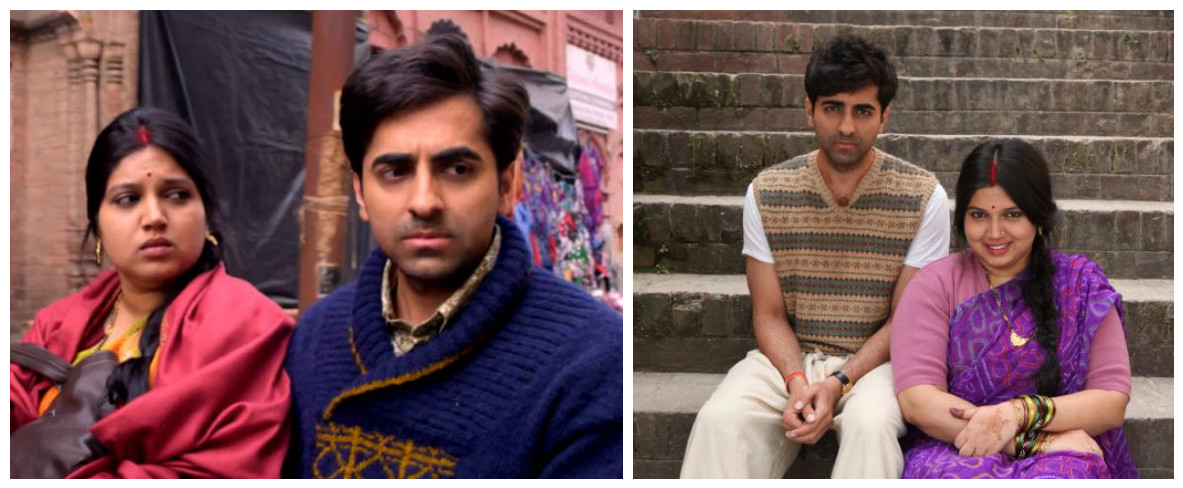




0 COMMENTS
WRITE COMMENT